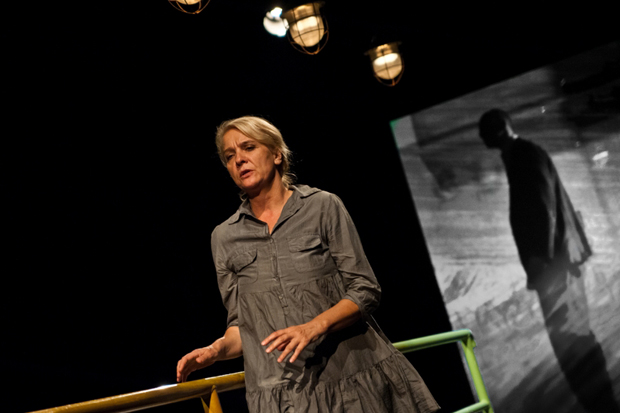Poland: Dissident theatre director fired by city mayor

Ewa Wojciak has been working in the in theatre since the 1970s when she was a dissident artist under the communist regime. (Photo: Maciej Zakrzewski)
Ewa Wojciak, director of Poland’s Theatre of the Eighth Day, was fired by Poznan mayor Ryszard Grobelny on 28 July. His administration oversees culture and arts in the city, including Wojciak’s subversive and anti-establishment theatre group.
The official reason given was that she did not ask for permission to leave the city between 18 and 28 February, when she visited Yale and Princeton universities, performing her touring duties as director and actress with the theatre. However, these trips were not sponsored by the local government, so it is hard to see why she would need permission from authorities.
Wojciak’s career with the theatre began in 1970 when she was a dissident artist under the communist regime. After the end of communism, she turned the theatre into a welcoming space for refugees, minorities, anti-facists, feminists, lesbian, gay, bisexual, and transgender people and emerging theatre-makers. She has become a “new dissident”, confronting the realities of life after communism. During her tenure, the theatre, known for its artistic experimentation and politically subversive productions, has drawn the fire of Grobelny, known for his ultraconservative views.
The Theatre of the Eighth Day has played at the Edinburgh Festival, London’s LIFT, at the universities of Yale and Princeton, as well as innumerable major and small venues in Poland. The New York Times has written on their production under the heading “When Courageous Artists Ripped Holes in the Iron Curtain“.
During last month’s Index on Censorship debate with Timothy Garton Ash, Kate Maltby and David Edgar, about freedom 25 years after the fall of the Berlin Wall, I tried to emphasise how important such new dissidents are in Eastern Europe. Commenting on this debate, Index CEO Jodie Ginsberg reminded us how authorities are taking an increasingly hard line on civil society groups.
The Theatre of the Eighth Day, which helped build an alternative civil society under communism, continues its non-conformity — and faces threats from Poznan’s political establishment. Wojciak is being unfairly dismissed for defying the far right, clericalism, the “moral majority” and censorship.
Grobelny’s record as mayor of Poznan, a job he has held since 1998, leaves much to be desired in an open, democratic society. He has repeatedly stifled independent voices in the city, and Wojciak has been a long-standing adversary. In 2005, Grobelny banned the Equality March, a feminist-queer pride event. Wojciak and other members of the Theatre of the Eighth Day took part in this forbidden event, which was suppressed by the police — one of the actors was arrested. More recently, Grobelny also supported the Poznan ban of the play Golgota Picnic, on which Index has reported.
In 2013 Wojciak was reprimanded by the mayor for a comment on her Facebook wall immediately after the conclave of Pope Francis: “[T]hey’ve elected a prick who denounced left-wing priests under the military dictatorship in Argentina.” Her Facebook account was shut down and Wojciak — mistaken about the Pope’s involvement with the Argentinian junta — was vilified by Poland’s far right. Her Facebook account was later restored and the Poznan prosecutor declined to pursue the matter. At the time, intellectuals and artists defended her on grounds of free expression.
Adam Michnik, editor-in-chief of Poland’s leading broadsheet Gazeta Wyborcza and a legendary dissident, wrote that he supports Wojciak. Michnik is a member of the committee of the fiftieth anniversary of the Theatre of the Eighth Day. A petition protesting the dismissal of Wojciak has been issued by civic-educational initiative Otwarta Akademia (“Open Academy”), spearheaded by Piotr Piotrowski, an art historian and former director of Warsaw’s National Museum (who initiated the groundbreaking exhibition Ars Homo Erotica there), feminist Izabela Kowalczyk, artist Marek Wasilewski and ethicist Roman Kubicki, among others.
This petition has so far been signed by 317 people, including Irena Grudzinska-Gross of Princeton University and Alina Cala of the Jewish Historical Institute in Warsaw, who both write on anti-semitism in Poland; Elzbieta Matynia of the New School for Social Research and author of Performative Democracy; Jeffrey C. Goldfarb, author of The Persistence of Freedom: The Sociological Implications of Polish Student Theatre; and Pawel Leszkowicz of Poznan University, curator of Ars Homo Erotica.
The Theatre of the Eighth Day epitomises liberty: Wojciak and her company speak out against injustices and experiment aesthetically. It’s deplorable that they should be repressed by the authorities of their city.
If you would like to protest the dismissal of Ewa Wojciak, please email [email protected] with the subject “Ewa”.
This article was posted on August 18, 2014 at indexoncensorship.org
